Unit 6 I am watching TV. Section A (Grammar focus-3c) 课件33张
文档属性
| 名称 | Unit 6 I am watching TV. Section A (Grammar focus-3c) 课件33张 | 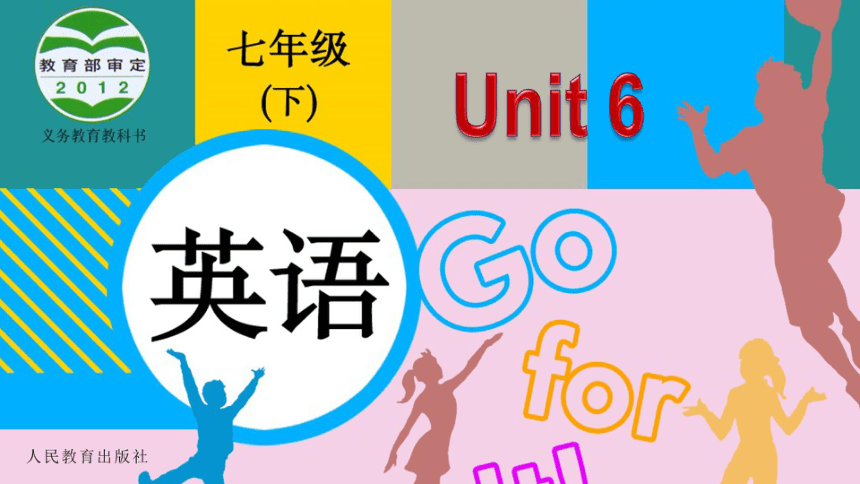 | |
| 格式 | pptx | ||
| 文件大小 | 4.5MB | ||
| 资源类型 | 教案 | ||
| 版本资源 | 人教新目标(Go for it)版 | ||
| 科目 | 英语 | ||
| 更新时间 | 2022-04-21 18:50:46 | ||
图片预览

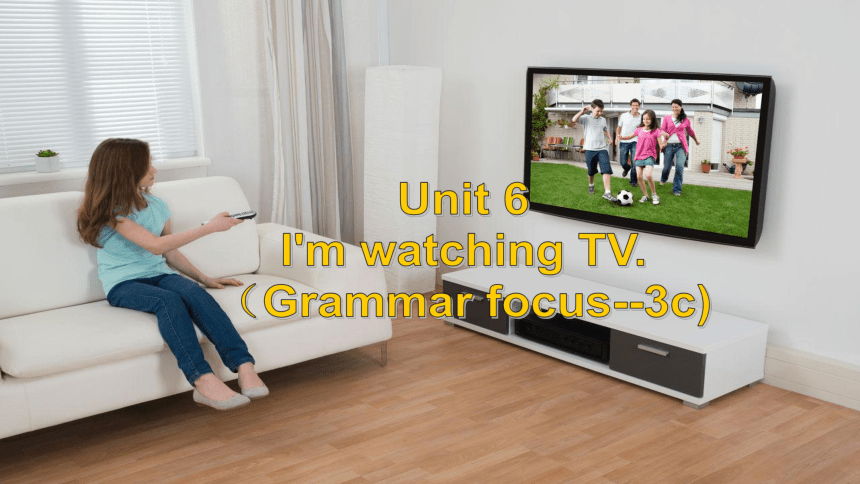
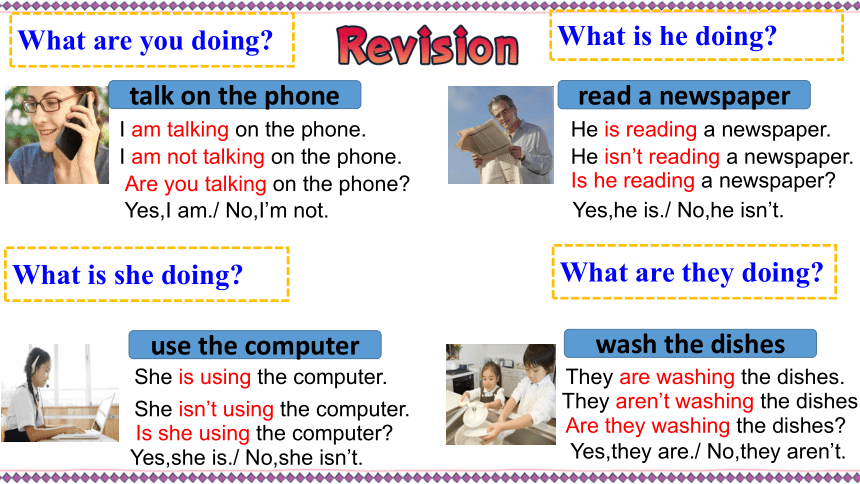
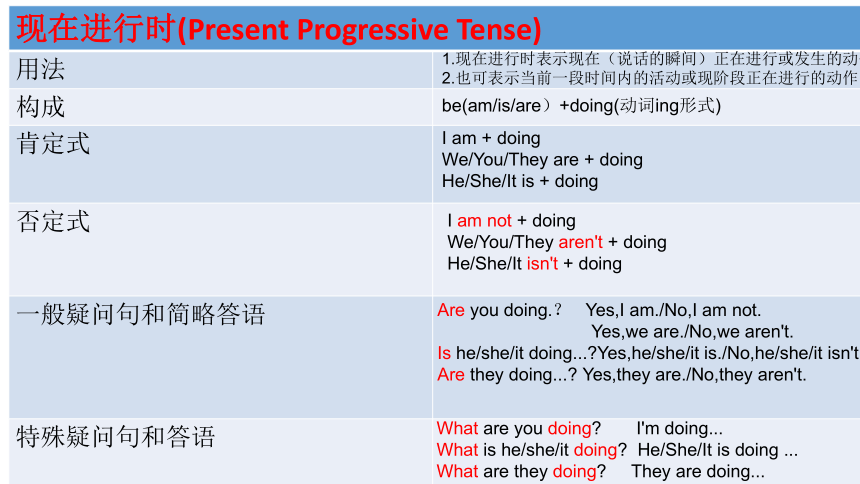
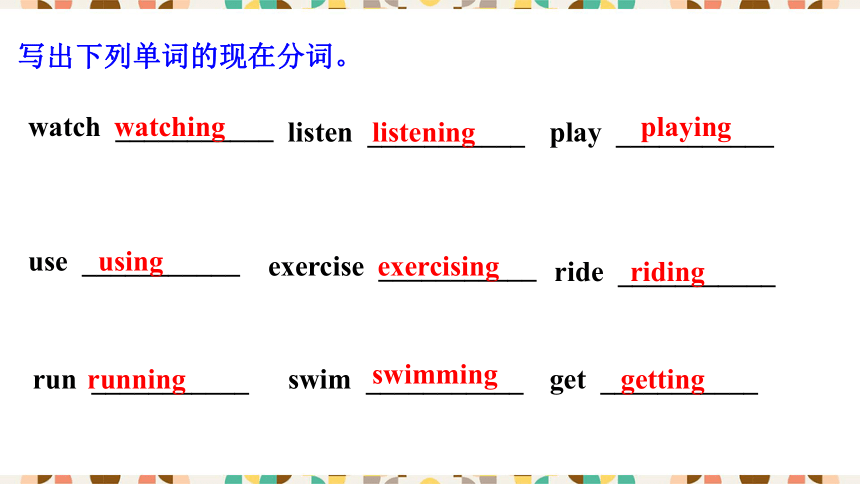
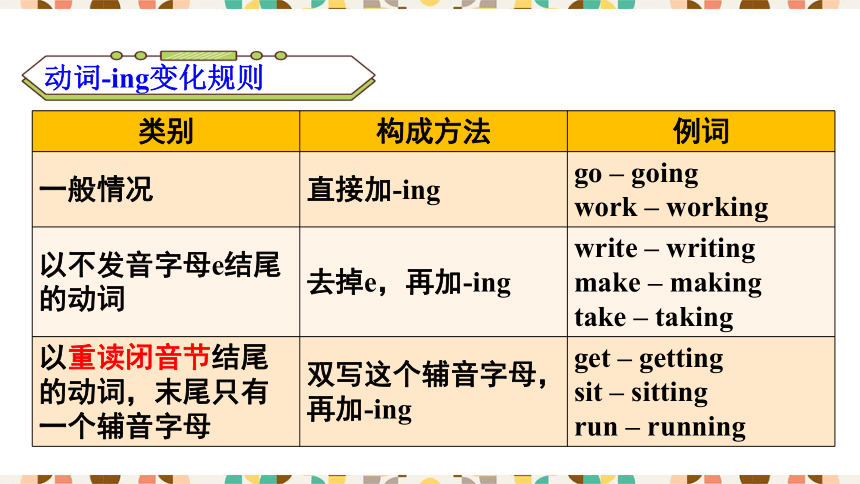
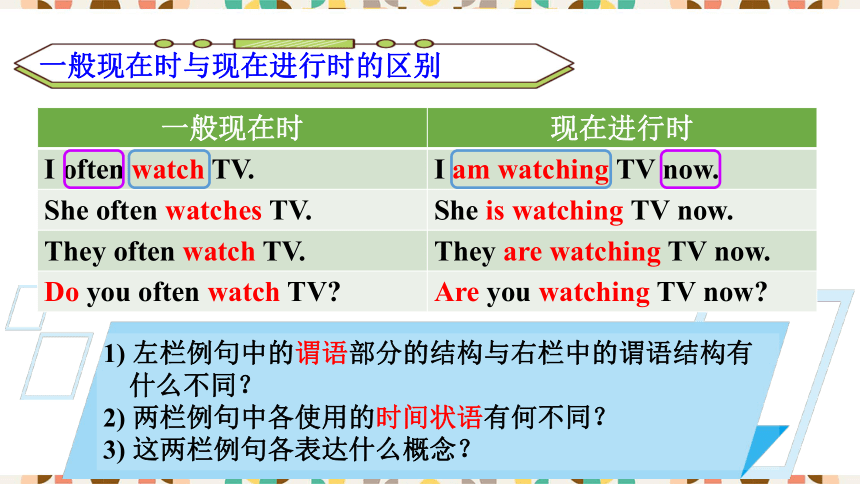
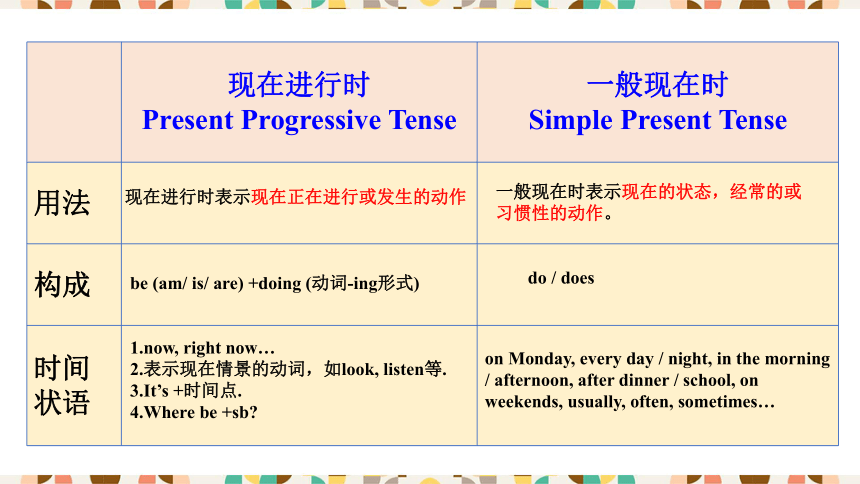
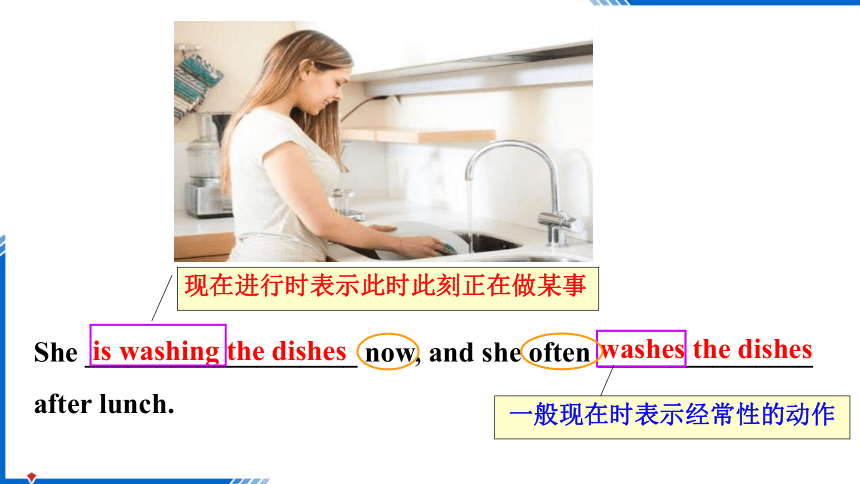
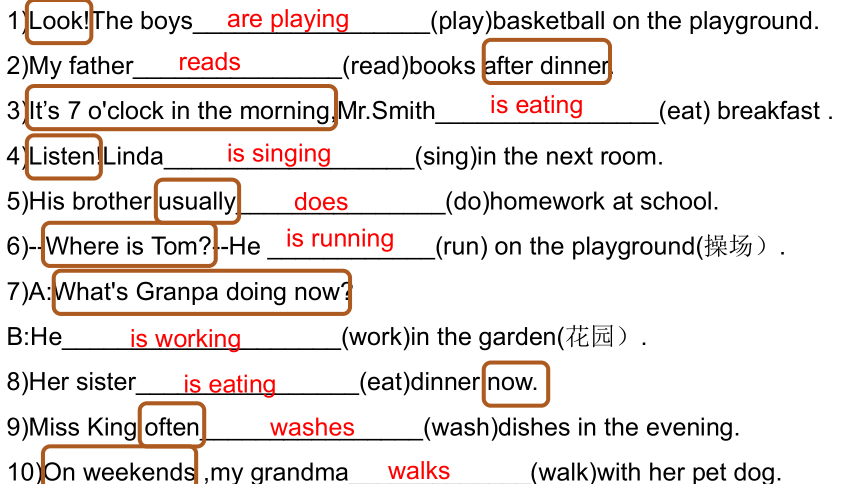
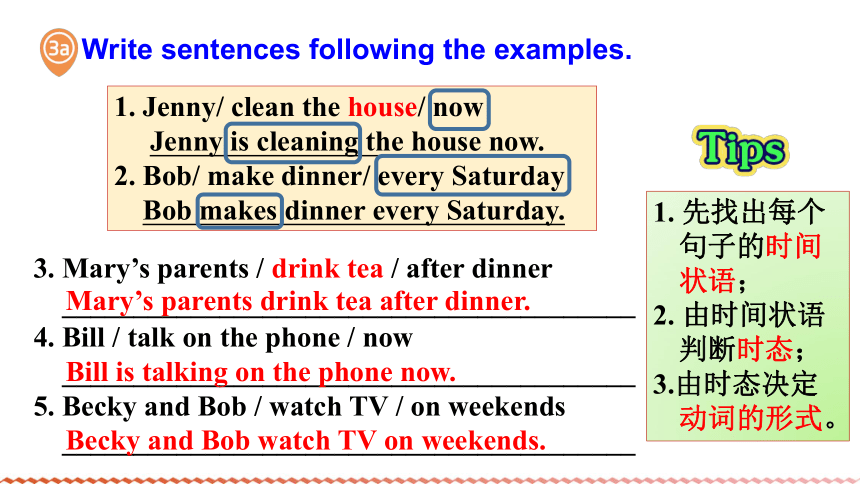
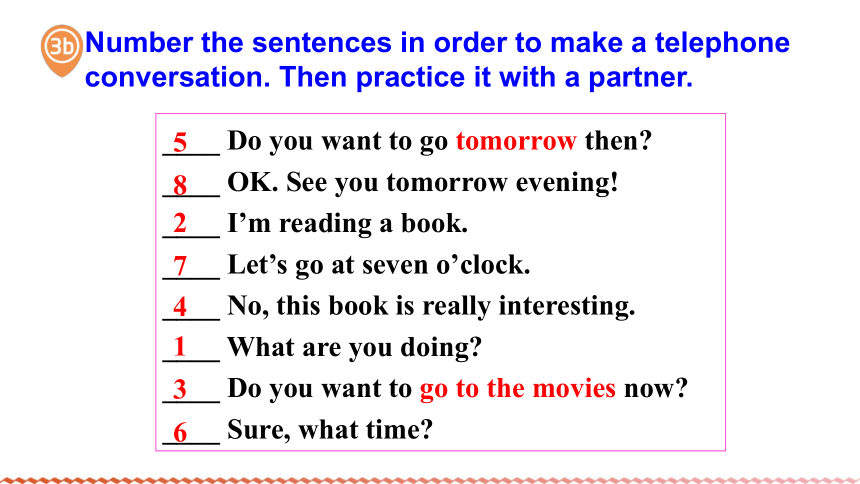
文档简介
(共33张PPT)
Unit 6
I'm watching TV.
(Grammar focus--3c)
What are you doing
What is he doing
He is reading a newspaper.
I am talking on the phone.
They are washing the dishes.
She is using the computer.
He isn’t reading a newspaper.
I am not talking on the phone.
They aren’t washing the dishes.
She isn’t using the computer.
Is he reading a newspaper
Are you talking on the phone
Are they washing the dishes
Is she using the computer
read a newspaper
talk on the phone
wash the dishes
use the computer
What is she doing
What are they doing
Yes,I am./ No,I’m not.
Yes,he is./ No,he isn’t.
Yes,she is./ No,she isn’t.
Yes,they are./ No,they aren’t.
现在进行时(Present Progressive Tense) 用法
构成
肯定式
否定式
一般疑问句和简略答语
特殊疑问句和答语
1.现在进行时表示现在(说话的瞬间)正在进行或发生的动作。
2.也可表示当前一段时间内的活动或现阶段正在进行的动作。
be(am/is/are)+doing(动词ing形式)
I am + doing
We/You/They are + doing
He/She/It is + doing
I am not + doing
We/You/They aren't + doing
He/She/It isn't + doing
Are you doing.? Yes,I am./No,I am not.
Yes,we are./No,we aren't.
Is he/she/it doing... Yes,he/she/it is./No,he/she/it isn't.
Are they doing... Yes,they are./No,they aren't.
What are you doing I'm doing...
What is he/she/it doing He/She/It is doing ...
What are they doing They are doing...
watch ___________
use ___________
listen ___________
exercise ___________
play ___________
ride ___________
写出下列单词的现在分词。
watching
listening
playing
using
exercising
riding
run ___________
running
swim ___________
swimming
get ___________
getting
动词-ing变化规则
类别 构成方法 例词
一般情况 直接加-ing go – going
work – working
以不发音字母e结尾的动词 去掉e,再加-ing write – writing
make – making
take – taking
以重读闭音节结尾的动词,末尾只有一个辅音字母 双写这个辅音字母,再加-ing get – getting
sit – sitting
run – running
一般现在时与现在进行时的区别
一般现在时 现在进行时
I often watch TV. I am watching TV now.
She often watches TV. She is watching TV now.
They often watch TV. They are watching TV now.
Do you often watch TV Are you watching TV now
1) 左栏例句中的谓语部分的结构与右栏中的谓语结构有什么不同?
2) 两栏例句中各使用的时间状语有何不同?
3) 这两栏例句各表达什么概念?
现在进行时 Present Progressive Tense 一般现在时
Simple Present Tense
用法
构成
时间状语
现在进行时表示现在正在进行或发生的动作
一般现在时表示现在的状态,经常的或习惯性的动作。
be (am/ is/ are) +doing (动词-ing形式)
do / does
1.now, right now…
2.表示现在情景的动词,如look, listen等.
3.It’s +时间点.
4.Where be +sb
on Monday, every day / night, in the morning / afternoon, after dinner / school, on weekends, usually, often, sometimes…
She ___________________ now, and she often _______________ after lunch.
is washing the dishes
washes the dishes
现在进行时表示此时此刻正在做某事
一般现在时表示经常性的动作
1)Look!The boys_________________(play)basketball on the playground.
2)My father_______________(read)books after dinner.
3)It’s 7 o'clock in the morning,Mr.Smith________________(eat) breakfast .
4)Listen!Linda__________________(sing)in the next room.
5)His brother usually_______________(do)homework at school.
6)--Where is Tom --He ____________(run) on the playground(操场).
7)A:What's Granpa doing now
B:He____________________(work)in the garden(花园).
8)Her sister________________(eat)dinner now.
9)Miss King often________________(wash)dishes in the evening.
10)On weekends ,my grandma_____________(walk)with her pet dog.
are playing
reads
is eating
is singing
does
is running
is working
is eating
washes
walks
3. Mary’s parents / drink tea / after dinner
________________________________________
4. Bill / talk on the phone / now
________________________________________
5. Becky and Bob / watch TV / on weekends
________________________________________
Write sentences following the examples.
1. Jenny/ clean the house/ now
Jenny is cleaning the house now.
2. Bob/ make dinner/ every Saturday
Bob makes dinner every Saturday.
Bill is talking on the phone now.
Mary’s parents drink tea after dinner.
Becky and Bob watch TV on weekends.
1. 先找出每个句子的时间状语;
2. 由时间状语判断时态;
3.由时态决定动词的形式。
____ Do you want to go tomorrow then
____ OK. See you tomorrow evening!
____ I’m reading a book.
____ Let’s go at seven o’clock.
____ No, this book is really interesting.
____ What are you doing
____ Do you want to go to the movies now
____ Sure, what time
Number the sentences in order to make a telephone conversation. Then practice it with a partner.
1
3
2
5
4
6
8
7
Practice the conversation with your partner.
A: What are you doing now
B: I’m reading a book.
A: Do you want to go to the movies now
B: No, this book is really interesting.
A: Do you want to go tomorrow then
B: Sure, what time
A: Let’s go at seven o’clock.
B: OK. See you tomorrow evening!
Take turns miming different activities in your group. The others in the group guess what the activities are.
游戏规则:1.一人表演卡片上的动作,不发出声音。其他同学猜测是什么动作。猜对的同学抽取卡片做动作,让其他同学继续猜。
2.用到的句式
Q:Are you (doing )...
A: Yes,you are right./
No, I’m not.
Look at the picture on the right. Answer the question “What is/are sb. doing ” Then write your answers down.
Sandy
Twin brothers
Sammy
father
mother
dog
一、用法
1. 表示现在(说话瞬间)正在进行或发生的动作。
我正在做作业。
I’m ________ my homework now.
他们在操场上踢足球。
They’re _________ soccer on the playground.
playing
doing
present progressive tense
(现在进行时)
2. 也可表示当前一段时间内的活动或现阶段正在进行的动作。
这些天来,我们在做一架模型飞机。
We are ____________________ these days.
making a model plane
这个月我们一直在为英语考试而学习。
We ______________ for the English test this month.
are studying
二、句子结构
1. 陈述句:主语+ be (am, is, are) (not) + v.-ing +…
我正在洗衣服。 _____________________________
他正在打电话。 _____________________________
他们没在下象棋。_____________________________
Peter没在打篮球。_____________________________
I’m washing the clothes.
They are not playing chess.
He is talking on the phone.
Peter isn’t playing basketball.
be 随着人称、数的变化而变化
2. 一般疑问句:
Be (Am, Is, Are) + 主语 + v.-ing …
她正在弹钢琴吗? _______________________________
你们正在做作业吗? _______________________________
Are you doing your homework
Is she playing the piano
3. 特殊疑问句
特殊疑问词+ be (am, is, are) +主语+ v.-ing…
杰克正做什么事情? _____________________________
他们正在做什么事情? ______________________________
What is Jack doing
What are they doing
四、常用时间状语
now, right now或表示现在情景的动词,如look, listen等。
格林先生现在正在写一个故事。
________________________________
看!他们正在吃早饭。
________________________________
Mr. Green is writing a story now.
Look! They’re eating breakfast.
She ___________________ now, and she often _______________ after lunch.
is washing the dishes
washes the dishes
现在进行时表示此时此刻正在做某事
一般现在时表示经常性的动作
He _______________________ now, and he usually _________________ at night.
is reading a newspaper
reads a newspaper
They __________________ now, and they usually ____________ in the morning.
are making soup
make soup
肯定式 I am + doing We/You/They are + doing
He/She/It is + doing
否定式 I am not + doing We/You/They aren’t + doing
He/She/It isn’t + doing
一般疑问句和简略答语 Am I doing… Yes, you are. / No, you are not (aren’t).
Are you doing… Yes, I am./ No, I am not.
Yes, we are./ No, we are not (aren’t).
Is he/she/it doing… Yes, he/she/it is. / No, he/she/it isn’t.
Are they doing… Yes, they are. / No, they are not (aren’t).
特殊疑问句和简略答语 What are you doing I’m doing…
What is he/she/it doing He/She/It is doing…
What are they doing They are doing…
Ⅰ. 根据语境及所给动词的提示填空。
1. —Who _________ your father _________(talk) to now
—Oh, that’s my uncle.
2. Jack _____________(not clean) his room. He ___________ (do) his homework now.
3. Look! They ____________(play) soccer over there.
4. —Are you at home, Frank
—Yes, I _________(have) lunch with my parents.
5. Keep quiet! Your sister ___________(sleep).
is talking
isn’t cleaning is doing
are playing
am having
is sleeping
Ⅱ. 根据短文内容及括号内所给动词的提示填空,使短文完整、通顺。
This is Jimmy. He (1)___________(be) from Australia, but now he (2)____________(live) in Beijing. He (3)__________ (work) in a middle school there. He usually has lots of work to do and he is busy from morning to evening but now he (4) ___________ (not work). He is walking home and (5)________ (talk) on the phone with his girlfriend Mary in Australia.
is
lives/is living
works
isn’t working
talking
He (6)____________(tell) her about his life in Beijing. He (7)____________(miss) her very much. Jimmy also (8)___________(write) her letters (信) or (9)___________ (e-mail) her. He always (10)____________(tell) her good news
(消息) about him.
is telling
misses
writes
e-mails
tells
To learn to use the present progressive tense:
-- What’s she doing
-- She is washing her clothes.
-- Are they using the computer
-- Yes, they are./ No, they aren’t. They’re exercising.
wash the dishes
What’s he doing
Is he washing the clothes
No, he …
What are they doing
listening to music
Are they listening to music
Yes…
house
drink
tea
drink tea
tomorrow
n. 房子
v. 喝
n. 饮料
n. 茶;茶叶
喝茶
adv. 在明天
n. 明天; 未来
drink v. 喝
e.g. drink wine 喝酒 drink water 喝水 drink tea 喝茶
drink coffee 喝咖啡 drink juice 喝果汁
drink beer 喝啤酒 drink milk 喝牛奶
drink n. 饮料 (既可作可数名词也可作不可数名词)
当指饮料的种类时为可数名词,如soft drinks (软饮料)。
【链接】
其他“喝”的英文表达:
have milk / tea 喝牛奶 / 茶
take / have coffee 喝咖啡
have / eat porridge / soup 喝粥 / 汤
【语境应用】完成句子。
(1) 早餐喝牛奶怎么样?
How about __________ __________ for breakfast
(2) Bill从来不喝咖啡。
Bill never __________ __________.
(3) 我们每天都需要喝水。
We need to __________ __________ every day.
drinking / having milk
drinks / takes / has coffee
drink water
Unit 6
I'm watching TV.
(Grammar focus--3c)
What are you doing
What is he doing
He is reading a newspaper.
I am talking on the phone.
They are washing the dishes.
She is using the computer.
He isn’t reading a newspaper.
I am not talking on the phone.
They aren’t washing the dishes.
She isn’t using the computer.
Is he reading a newspaper
Are you talking on the phone
Are they washing the dishes
Is she using the computer
read a newspaper
talk on the phone
wash the dishes
use the computer
What is she doing
What are they doing
Yes,I am./ No,I’m not.
Yes,he is./ No,he isn’t.
Yes,she is./ No,she isn’t.
Yes,they are./ No,they aren’t.
现在进行时(Present Progressive Tense) 用法
构成
肯定式
否定式
一般疑问句和简略答语
特殊疑问句和答语
1.现在进行时表示现在(说话的瞬间)正在进行或发生的动作。
2.也可表示当前一段时间内的活动或现阶段正在进行的动作。
be(am/is/are)+doing(动词ing形式)
I am + doing
We/You/They are + doing
He/She/It is + doing
I am not + doing
We/You/They aren't + doing
He/She/It isn't + doing
Are you doing.? Yes,I am./No,I am not.
Yes,we are./No,we aren't.
Is he/she/it doing... Yes,he/she/it is./No,he/she/it isn't.
Are they doing... Yes,they are./No,they aren't.
What are you doing I'm doing...
What is he/she/it doing He/She/It is doing ...
What are they doing They are doing...
watch ___________
use ___________
listen ___________
exercise ___________
play ___________
ride ___________
写出下列单词的现在分词。
watching
listening
playing
using
exercising
riding
run ___________
running
swim ___________
swimming
get ___________
getting
动词-ing变化规则
类别 构成方法 例词
一般情况 直接加-ing go – going
work – working
以不发音字母e结尾的动词 去掉e,再加-ing write – writing
make – making
take – taking
以重读闭音节结尾的动词,末尾只有一个辅音字母 双写这个辅音字母,再加-ing get – getting
sit – sitting
run – running
一般现在时与现在进行时的区别
一般现在时 现在进行时
I often watch TV. I am watching TV now.
She often watches TV. She is watching TV now.
They often watch TV. They are watching TV now.
Do you often watch TV Are you watching TV now
1) 左栏例句中的谓语部分的结构与右栏中的谓语结构有什么不同?
2) 两栏例句中各使用的时间状语有何不同?
3) 这两栏例句各表达什么概念?
现在进行时 Present Progressive Tense 一般现在时
Simple Present Tense
用法
构成
时间状语
现在进行时表示现在正在进行或发生的动作
一般现在时表示现在的状态,经常的或习惯性的动作。
be (am/ is/ are) +doing (动词-ing形式)
do / does
1.now, right now…
2.表示现在情景的动词,如look, listen等.
3.It’s +时间点.
4.Where be +sb
on Monday, every day / night, in the morning / afternoon, after dinner / school, on weekends, usually, often, sometimes…
She ___________________ now, and she often _______________ after lunch.
is washing the dishes
washes the dishes
现在进行时表示此时此刻正在做某事
一般现在时表示经常性的动作
1)Look!The boys_________________(play)basketball on the playground.
2)My father_______________(read)books after dinner.
3)It’s 7 o'clock in the morning,Mr.Smith________________(eat) breakfast .
4)Listen!Linda__________________(sing)in the next room.
5)His brother usually_______________(do)homework at school.
6)--Where is Tom --He ____________(run) on the playground(操场).
7)A:What's Granpa doing now
B:He____________________(work)in the garden(花园).
8)Her sister________________(eat)dinner now.
9)Miss King often________________(wash)dishes in the evening.
10)On weekends ,my grandma_____________(walk)with her pet dog.
are playing
reads
is eating
is singing
does
is running
is working
is eating
washes
walks
3. Mary’s parents / drink tea / after dinner
________________________________________
4. Bill / talk on the phone / now
________________________________________
5. Becky and Bob / watch TV / on weekends
________________________________________
Write sentences following the examples.
1. Jenny/ clean the house/ now
Jenny is cleaning the house now.
2. Bob/ make dinner/ every Saturday
Bob makes dinner every Saturday.
Bill is talking on the phone now.
Mary’s parents drink tea after dinner.
Becky and Bob watch TV on weekends.
1. 先找出每个句子的时间状语;
2. 由时间状语判断时态;
3.由时态决定动词的形式。
____ Do you want to go tomorrow then
____ OK. See you tomorrow evening!
____ I’m reading a book.
____ Let’s go at seven o’clock.
____ No, this book is really interesting.
____ What are you doing
____ Do you want to go to the movies now
____ Sure, what time
Number the sentences in order to make a telephone conversation. Then practice it with a partner.
1
3
2
5
4
6
8
7
Practice the conversation with your partner.
A: What are you doing now
B: I’m reading a book.
A: Do you want to go to the movies now
B: No, this book is really interesting.
A: Do you want to go tomorrow then
B: Sure, what time
A: Let’s go at seven o’clock.
B: OK. See you tomorrow evening!
Take turns miming different activities in your group. The others in the group guess what the activities are.
游戏规则:1.一人表演卡片上的动作,不发出声音。其他同学猜测是什么动作。猜对的同学抽取卡片做动作,让其他同学继续猜。
2.用到的句式
Q:Are you (doing )...
A: Yes,you are right./
No, I’m not.
Look at the picture on the right. Answer the question “What is/are sb. doing ” Then write your answers down.
Sandy
Twin brothers
Sammy
father
mother
dog
一、用法
1. 表示现在(说话瞬间)正在进行或发生的动作。
我正在做作业。
I’m ________ my homework now.
他们在操场上踢足球。
They’re _________ soccer on the playground.
playing
doing
present progressive tense
(现在进行时)
2. 也可表示当前一段时间内的活动或现阶段正在进行的动作。
这些天来,我们在做一架模型飞机。
We are ____________________ these days.
making a model plane
这个月我们一直在为英语考试而学习。
We ______________ for the English test this month.
are studying
二、句子结构
1. 陈述句:主语+ be (am, is, are) (not) + v.-ing +…
我正在洗衣服。 _____________________________
他正在打电话。 _____________________________
他们没在下象棋。_____________________________
Peter没在打篮球。_____________________________
I’m washing the clothes.
They are not playing chess.
He is talking on the phone.
Peter isn’t playing basketball.
be 随着人称、数的变化而变化
2. 一般疑问句:
Be (Am, Is, Are) + 主语 + v.-ing …
她正在弹钢琴吗? _______________________________
你们正在做作业吗? _______________________________
Are you doing your homework
Is she playing the piano
3. 特殊疑问句
特殊疑问词+ be (am, is, are) +主语+ v.-ing…
杰克正做什么事情? _____________________________
他们正在做什么事情? ______________________________
What is Jack doing
What are they doing
四、常用时间状语
now, right now或表示现在情景的动词,如look, listen等。
格林先生现在正在写一个故事。
________________________________
看!他们正在吃早饭。
________________________________
Mr. Green is writing a story now.
Look! They’re eating breakfast.
She ___________________ now, and she often _______________ after lunch.
is washing the dishes
washes the dishes
现在进行时表示此时此刻正在做某事
一般现在时表示经常性的动作
He _______________________ now, and he usually _________________ at night.
is reading a newspaper
reads a newspaper
They __________________ now, and they usually ____________ in the morning.
are making soup
make soup
肯定式 I am + doing We/You/They are + doing
He/She/It is + doing
否定式 I am not + doing We/You/They aren’t + doing
He/She/It isn’t + doing
一般疑问句和简略答语 Am I doing… Yes, you are. / No, you are not (aren’t).
Are you doing… Yes, I am./ No, I am not.
Yes, we are./ No, we are not (aren’t).
Is he/she/it doing… Yes, he/she/it is. / No, he/she/it isn’t.
Are they doing… Yes, they are. / No, they are not (aren’t).
特殊疑问句和简略答语 What are you doing I’m doing…
What is he/she/it doing He/She/It is doing…
What are they doing They are doing…
Ⅰ. 根据语境及所给动词的提示填空。
1. —Who _________ your father _________(talk) to now
—Oh, that’s my uncle.
2. Jack _____________(not clean) his room. He ___________ (do) his homework now.
3. Look! They ____________(play) soccer over there.
4. —Are you at home, Frank
—Yes, I _________(have) lunch with my parents.
5. Keep quiet! Your sister ___________(sleep).
is talking
isn’t cleaning is doing
are playing
am having
is sleeping
Ⅱ. 根据短文内容及括号内所给动词的提示填空,使短文完整、通顺。
This is Jimmy. He (1)___________(be) from Australia, but now he (2)____________(live) in Beijing. He (3)__________ (work) in a middle school there. He usually has lots of work to do and he is busy from morning to evening but now he (4) ___________ (not work). He is walking home and (5)________ (talk) on the phone with his girlfriend Mary in Australia.
is
lives/is living
works
isn’t working
talking
He (6)____________(tell) her about his life in Beijing. He (7)____________(miss) her very much. Jimmy also (8)___________(write) her letters (信) or (9)___________ (e-mail) her. He always (10)____________(tell) her good news
(消息) about him.
is telling
misses
writes
e-mails
tells
To learn to use the present progressive tense:
-- What’s she doing
-- She is washing her clothes.
-- Are they using the computer
-- Yes, they are./ No, they aren’t. They’re exercising.
wash the dishes
What’s he doing
Is he washing the clothes
No, he …
What are they doing
listening to music
Are they listening to music
Yes…
house
drink
tea
drink tea
tomorrow
n. 房子
v. 喝
n. 饮料
n. 茶;茶叶
喝茶
adv. 在明天
n. 明天; 未来
drink v. 喝
e.g. drink wine 喝酒 drink water 喝水 drink tea 喝茶
drink coffee 喝咖啡 drink juice 喝果汁
drink beer 喝啤酒 drink milk 喝牛奶
drink n. 饮料 (既可作可数名词也可作不可数名词)
当指饮料的种类时为可数名词,如soft drinks (软饮料)。
【链接】
其他“喝”的英文表达:
have milk / tea 喝牛奶 / 茶
take / have coffee 喝咖啡
have / eat porridge / soup 喝粥 / 汤
【语境应用】完成句子。
(1) 早餐喝牛奶怎么样?
How about __________ __________ for breakfast
(2) Bill从来不喝咖啡。
Bill never __________ __________.
(3) 我们每天都需要喝水。
We need to __________ __________ every day.
drinking / having milk
drinks / takes / has coffee
drink water
同课章节目录
- Unit 1 Can you play the guitar?
- Section A
- Section B
- Unit 2 What time do you go to school?
- Section A
- Section B
- Unit 3 How do you get to school?
- Section A
- Section B
- Unit 4 Don't eat in class.
- Section A
- Section B
- Unit 5 Why do you like pandas?
- Section A
- Section B
- Unit 6 I'm watching TV.
- Section A
- Section B
- Review of Units 1-6
- Unit 7 It's raining!
- Section A
- Section B
- Unit 8 Is there a post office near here?
- Section A
- Section B
- Unit 9 What does he look like?
- Section A
- Section B
- Unit 10 I'd like some noodles.
- Section A
- Section B
- Unit 11 How was your school trip?
- Section A
- Section B
- Unit 12 What did you do last weekend?
- Section A
- Section B
